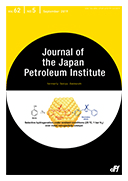
JOURNAL OF THE JAPAN PETROLEUM INSTITUTE
metrics 2024
Pioneering Insights in Energy Engineering and Fuel Technology
Introduction
JOURNAL OF THE JAPAN PETROLEUM INSTITUTE, published by the Japan Petroleum Institute, is a leading scholarly journal dedicated to advancing research and innovation in the fields of Energy Engineering, Fuel Technology, and related disciplines. With an ISSN of 1346-8804 and an E-ISSN of 1349-273X, the journal has established a significant presence within the academic community, recognized for its impact and rigor, as evidenced by its Q3 quartile rankings in both Energy Engineering and Power Technology and Fuel Technology as of 2023. The journal, which converges research from 2002 to 2024, provides a vital platform for researchers, professionals, and students to share their findings and insights into petroleum-related challenges and advancements. While specific metrics such as HIndex are not stated, the journal's inclusion in leading academic databases reflects its commitment to quality and accessibility in research dissemination. Readers can view the journal's open access options to engage with cutting-edge studies that contribute to the sustainable advancements in energy resources and technology. Situated in Tokyo, Japan, this journal continues to play an essential role in fostering dialogue and discovery within the petroleum research community.
Metrics 2024
 0.26
0.26 0.60
0.60 0.70
0.70 31
31Metrics History
Rank 2024
Scopus
IF (Web Of Science)
JCI (Web Of Science)
Quartile History
Similar Journals
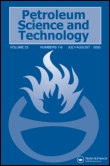
PETROLEUM SCIENCE AND TECHNOLOGY
Innovating solutions for a sustainable energy future.PETROLEUM SCIENCE AND TECHNOLOGY, published by Taylor & Francis Inc, is a pivotal journal dedicated to advancing the multidisciplinary field of petroleum engineering and related technologies. With an ISSN of 1091-6466 and an E-ISSN of 1532-2459, this journal serves as a vital platform for disseminating research in areas ranging from geotechnical engineering to energy technology. As of 2023, it is recognized in the Q3 quartile across several categories, including Chemical Engineering and Fuel Technology, signifying its respectable standing within the academic community. With a convergence timeline from 1997 to 2024, the journal continuously addresses crucial issues in the energy sector, making it essential reading for researchers, industry professionals, and policy-makers alike. Although not an open access journal, its rigorous peer-reviewed articles contribute significantly to the advancement of knowledge and innovation within these fields, reflecting the journal's commitment to promoting scientific understanding and practical applications.

CHEMICAL AND PETROLEUM ENGINEERING
Connecting Scholars in Chemical and Petroleum EngineeringChemical and Petroleum Engineering is a prestigious academic journal dedicated to the advancement of knowledge in the fields of chemical engineering and petroleum technologies. Published by Springer, this journal serves as a vital resource for researchers, professionals, and students interested in the intricate processes and innovations that drive these industries. With an ISSN of 0009-2355 and an E-ISSN of 1573-8329, it has established a notable presence since its inception in 1965. Throughout its converged years, the journal has continually published impactful research that contributes to sustainability and efficiency within the sectors. Although it holds a Q3 ranking in Chemical Engineering and Fuel Technology and a Q4 ranking in Energy Engineering and Geochemistry, it is a noteworthy platform for emerging studies, fostering connections among scholars. Readers will find a wealth of information and ideas, but please note that this journal does not currently offer open access options. For those passionate about chemical and petroleum engineering, this journal is an essential part of staying informed and engaged with the latest scientific advancements.

CHEMISTRY AND TECHNOLOGY OF FUELS AND OILS
Empowering Knowledge in Fuels and Oils for a Greener FutureCHEMISTRY AND TECHNOLOGY OF FUELS AND OILS, published by SPRINGER, is a pivotal journal dedicated to advancing the understanding and technologies surrounding fuels and oils. With its ISSN 0009-3092 and E-ISSN 1573-8310, this journal has been a reliable resource in the field since its inception in 1965, providing insights into the latest research and developments up until 2024. While it currently holds a Q4 status across various quartiles, including Chemical Engineering and Fuel Technology as of 2023, the journal's commitment to disseminating valuable knowledge plays a crucial role in nurturing the academic discourse surrounding energy and chemical processes. Although it does not offer Open Access, the journal is critical for researchers, professionals, and students aiming to deepen their expertise in energy engineering, chemical engineering, and fuel technology. Its contributions underlie significant advancements in sustainable energy practices and fuel innovations, making it an essential read for those engaged in these crucial scientific domains.
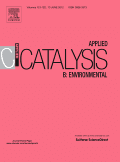
Applied Catalysis B-Environment and Energy
Empowering researchers to shape a cleaner, energy-efficient world.Applied Catalysis B-Environment and Energy, published by Elsevier, is a leading journal in the fields of catalysis, environmental science, and process chemistry, with an impressive impact factor that reflects its significance in advancing research and innovation. Established in 1992, this esteemed journal has earned a prestigious status as evidenced by its 2023 category quartiles—ranking in the Q1 category for Catalysis, Environmental Science, and Process Chemistry and Technology. With consistently high rankings in the Scopus database, it holds a remarkable position as #1 in General Environmental Science and #2 in both Process Chemistry and Catalysis, showcasing its profound impact on the respective fields. The journal’s scope encompasses both theoretical and practical research, targeting the pivotal developments in catalysis that promote sustainable practices and energy efficiency. Researchers, professionals, and students alike will find invaluable insights and cutting-edge studies published within its pages, making it an essential resource for those invested in pioneering advancements for a greener, more energy-efficient future.

PETROLEUM CHEMISTRY
Transforming Knowledge into Progress in Petroleum Chemistry.Petroleum Chemistry is a premier journal dedicated to the advancement of knowledge in the field of petroleum science and technology. Published by MAIK Nauka/Interperiodica/Springer, it serves as a vital resource for researchers, professionals, and students interested in various aspects of petroleum chemistry, including exploration, extraction, and processing. With an ISSN of 0965-5441 and an E-ISSN of 1555-6239, the journal has a robust publication history, converging from 1991 to 2024. It holds a respectable position in the academic community, as evidenced by its category quartiles in 2023, being ranked in the Q3 tier across multiple disciplines such as Chemical Engineering, Chemistry, and Energy Technology. Although the journal is not open access, it offers comprehensive insights that fuel ongoing research and innovation within the sector, making it essential reading for those invested in the future of energy and fuel technology.

Solid Fuel Chemistry
Innovating Chemistry for Sustainable EnergySolid Fuel Chemistry is a pivotal journal published by PLEIADES PUBLISHING INC, dedicated to advancing knowledge in the fields of chemical engineering, chemistry, and fuel technology. With its ISSN 0361-5219 and E-ISSN 1934-8029, this esteemed publication has been contributing to the scientific community since its inception, covering extensive research from 1975 to 2024. Operating within the Q3 and Q4 quartiles, it holds a significant position among peers in its categories, ranked 94th in Energy & Fuel Technology and 212th in General Chemical Engineering. Although it lacks an open access option, the journal remains a vital resource for researchers, professionals, and students eager to explore innovative developments in solid fuels and their applications. The articles published in Solid Fuel Chemistry provide essential insights, facilitate collaboration, and inspire further research, making it an indispensable platform for anyone engaged in this essential field of study.
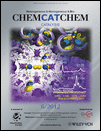
ChemCatChem
Exploring the Frontiers of Chemical Innovation.ChemCatChem is a leading international journal published by WILEY-V C H VERLAG GMBH that has been making significant contributions to the fields of catalysis, inorganic and organic chemistry, as well as physical and theoretical chemistry since its inception in 2009. With an established reputation for excellence, this journal holds commendable rankings in various categories, including Q1 in Inorganic Chemistry and Q1 in Organic Chemistry, demonstrating its pivotal role in advancing scientific knowledge and innovation. Notably, it has achieved a high Scopus ranking, securing 10th place out of 79 in Inorganic Chemistry, among others, showcasing its influence and quality. Although open access options are not available, the journal offers cutting-edge research articles, reviews, and insights that are vital for researchers, professionals, and students aiming to stay at the forefront of chemical science. With its address rooted in Weinheim, Germany, and convergence projected to continue until 2024, ChemCatChem remains a dynamic platform for disseminating vital advancements within the chemical community.

SOCAR Proceedings
Bridging Disciplines to Tackle Global Energy Challenges.SOCAR Proceedings is a distinguished academic journal published by the State Oil Company of the Azerbaijan Republic, specifically from the Oil Gas Scientific Research Project Institute. This journal addresses vital aspects of various interdisciplinary fields including Applied Mathematics, Chemical Engineering, Energy Engineering, and Geosciences, making it an essential resource for researchers and professionals alike. Since its inception in 2010, SOCAR Proceedings has cultivated significant contributions to the knowledge base, particularly as it boasts a respectable Q3 category ranking across several relevant fields for 2023. As a journal known for its commitment to disseminating innovative research, it offers invaluable insights into the energy sector that are particularly pertinent to the regional and global challenges posed by resource management and environmental sustainability. With an evolving focus up to 2024, SOCAR Proceedings continues to foster scholarly dialogue and research advancements, making it a vital forum for students and academics looking to deepen their understanding of energy and engineering sciences.
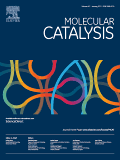
Molecular Catalysis
Exploring Innovations in Molecular CatalysisMolecular Catalysis, published by Elsevier in Netherlands, is a premier academic journal that explores the cutting-edge domain of catalytic science. With an impressive impact factor and classified in the top quartiles (Q2) in various fields such as Catalysis, Physical and Theoretical Chemistry, and Process Chemistry and Technology, this journal stands as a significant resource for researchers and professionals committed to advancing the understanding of catalysis processes. Since its inception in 2017, it has been pivotal in publishing high-quality, peer-reviewed research that addresses crucial challenges and innovations in molecular catalysis. The journal is fully Open Access, allowing unrestricted access to its articles, thus fostering a wider dissemination of knowledge. Recognized for its rigorous editorial standards, it features works that push the boundaries of current scientific understanding, making it an essential platform for students and academics alike to share and grow in their expertise.
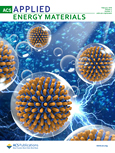
ACS Applied Energy Materials
Innovating the Future of Energy through ResearchACS Applied Energy Materials, published by the American Chemical Society, is a premier journal dedicated to the cutting-edge fields of energy materials, chemical engineering, and electrochemistry. With an impressive impact factor and consistently ranked in the Q1 category across multiple disciplines—including Chemical Engineering, Electrical and Electronic Engineering, and Materials Chemistry—this journal serves as a pivotal platform for researchers and professionals focused on innovative solutions for energy systems and materials science. Since its inception in 2018, ACS Applied Energy Materials has been committed to disseminating high-quality research that addresses pressing energy challenges, promoting sustainability and efficiency in various applications. Its competitive Scopus rankings reflect the journal's influence and relevance within the academic community, making it an essential resource for anyone looking to stay at the forefront of energy materials research.